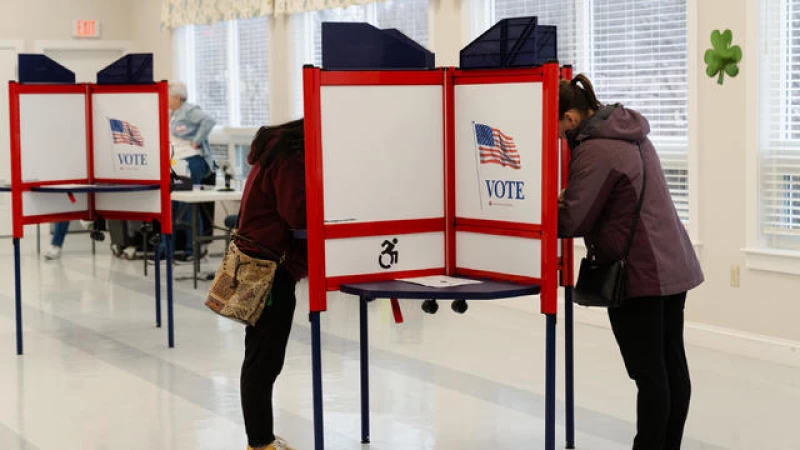Former President Donald Trump made a surprising announcement that could impact his support in the upcoming election. In a post on Truth Social last Friday, Trump encouraged his followers to consider utilizing early and absentee voting methods.
Trump's message marked a significant departure from his previous stance on voting practices. Sources close to the former president revealed that senior advisers and external groups have been pushing for this change for months.
According to a high-ranking Republican source familiar with the discussions, advisers have emphasized the importance of embracing all forms of voting, regardless of how they are cast.
The source explained, "He understands that a lot of his supporters want to get out and vote for him, and that's a resource advantage to us."
Trump has been a vocal opponent of early, absentee, and mail-in voting for years, attributing election fraud to these practices and fostering distrust among voters. Despite his stance, Trump himself has regularly utilized early voting methods.
"We have to get rid of mail-in ballots because once you have mail-in ballots, you have crooked elections," Trump declared in his victory speech following the Iowa caucuses in January.
One of the pivotal factors that influenced Trump's shift towards supporting early and mail-in voting was the data presented by his advisers. This data indicated that by embracing early voting, the campaign could effectively expand its reach to swing voters in crucial battleground states.
Advisers are optimistic that this strategy could help Trump compete more evenly with Mr. Biden on Election Day, as Democrats have historically reaped the benefits of early and absentee voting. However, the challenge lies in whether Trump can consistently promote early-voting initiatives in the lead-up to the election.
Despite the potential for a shift in strategy, there are indications of conflicting messages. During an interview with Newsmax on Thursday night, Trump emphasized the need for "paper ballots" and advocated for voter ID and same-day voting.
It is worth noting that a substantial percentage of ballots cast in the U.S. already have a paper trail, with 93% of ballots in 2020 having a paper record, according to the Brennan Center.
Voter behavior underwent a significant shift in 2020: a larger number of Americans opted for early voting as the coronavirus pandemic complicated and reduced in-person voting opportunities.
Sixty-nine percent of voters across the country either submitted their ballot by mail or participated in early voting during the 2020 election — marking the highest rate of nontraditional voting in a presidential election, as reported by the Census.
Aside from the shift in Trump's messaging, Republicans will need to address a growing divide between the two major parties regarding support for absentee and early voting. The disparity between Democrats and Republicans in terms of early voting has widened overall, with variations by state, according to insights from Kabir Khanna, CBS News' deputy director of Elections & Data Analytics.
For instance, Pennsylvania — a crucial battleground state — displayed one of the largest party divides based on voting method. During the 2020 election, Mr. Biden secured the mail-in and absentee votes by a margin exceeding 50 points, while Trump dominated the Election Day votes by more than 30 points. Ultimately, Mr. Biden clinched victory in the state by a narrow 1.2% margin.
Nevertheless, in other battleground states where mail-in voting has been prevalent in recent elections, both parties tend to make use of early voting opportunities.
In Arizona, Georgia, North Carolina, and Texas, the vast majority of ballots for both candidates were cast ahead of Election Day in 2020 — upwards of 90% depending on the state, meaning most Biden and Trump voters cast their ballots early in these four states in the height of the pandemic. Texas has a long in-person early-voting period but strictly limits mail-in voting.
Still, Republican voters in these states tend to favor voting in person more than voting by mail these days, Khanna says.
"In Georgia and North Carolina, more Trump voters than Biden voters showed up to vote early in person in 2020," Khanna said. "Persuading them to vote absentee may be a bigger lift for the campaign."
The shift in Trump's rhetoric comes also as new leadership at the Republican National Committee has made revitalizing absentee and early voting programs, known as ABEV for short, a top priority.
The RNC's existing program, titled "Bank Your Vote," was launched in 2023 and included websites educating voters in all 50 states about how to vote early.
The embrace of early voting practices was met with open arms by Republican groups that lobbied Trump advisers for a change and stressed that more needed to be done ahead of November.
Jessica Anderson, the president of the conservative super PAC Sentinel Action Fund, which focuses heavily on turning out early and absentee voters, said an embrace of ABEV programs would be a game changer for Republicans in the 2024 presidential race.
Conservatives Urged to Embrace Early and Absentee Voting for 2024 Strategy
"President Trump's embrace of early and absentee voting should be a clarion call for conservatives to unite behind this winning strategy for 2024," stated Anderson. "We can no longer go into Election Day hundreds of thousands of votes behind because we refuse to adapt to the rules on the ground—as much as we may not like them."






